Produced by Flood and mixed in the main by François Kevorkian, DEPECHE MODE’s seventh album ‘Violator’ was the classic line-up of Dave Gahan, Martin Gore, Andy Fletcher and Alan Wilder firing on all cylinders.
The end result was four hit singles and five other songs that were more or less their equal. Although best known for ‘Enjoy The Silence’, ‘Personal Jesus’, ‘Policy Of Truth’ and ‘World In My Eyes’, the album featured some of DEPECHE MODE’s best work.
The beautiful haunting ambience of ‘Waiting For The Night’ using the ARP 2600 synth / ARP 1601 sequencer combination and the climactic electro blues of ‘Clean’ were key highlights that ended each side of the original vinyl.
Of ‘Waiting For The Night’, Alan Wilder told ELECTRICITYCLUB.CO.UK in a 2011 interview: “the main sequencer part here was produced using the ARP 2600 synth and sequencer, because it has many flaws when setting up your 16 note sequence (for example tuning and gate length) – this makes for happy accidents and almost random events. We would have fiddled around with that sequence for a while, tweaking the filters and envelopes within the ARP until we arrived at that particularly hypnotic end result. The resulting sequence shape would follow any held note on a keyboard to transpose between the song’s basic chord changes as it ran, which we would then record, and that is essentially the spine of the whole thing. All the other sounds in that song act as mere embellishment.”
The seamless second side with its instrumental interludes added tension and experimentation to proceedings while Martin Gore’s lyrics possessed an honesty that while dark and deviant, still retained a naïve innocence that many loners could relate to. The emotive if strange ‘Blue Dress’ is possibly the most under rated song in the DEPECHE MODE catalogue; the simple guilty pleasure of watching your girlfriend get ready for an evening out was a touching moment.
But the undoubted stand-out on ‘Violator’ was ‘Halo’; using drums sampled from LED ZEPPELIN’s ‘When The Levee Breaks’ but secondhand via a rap record, the distinctive bass squelch and screeching Elgar derived string samples hit home as the song built to its terrific, euphoric climax.
The ‘World Violation’ tour in 1990 was also DEPECHE MODE’s best ever. The status of those shows fell into legend as a result of no officially sanctioned concert footage ever being released. The memories of those present still recall in awe, Anton Corbijn’s stark but humourous projections and Dave Gahan’s increasingly confident and exaggerated swagger to suit the increasing bigger venues.
But why is ‘Violator’ so important and highly celebrated? It is still DEPECHE MODE’s most complete and accomplished body of work; people still talk about it because it is a good record. A good record is a good record, no matter what forlorn nostalgia may be lingering within the listener.
‘Violator’ is a complete body of work, unlike the patchier follow-up ‘Songs Of Faith & Devotion’ when on the subsequent ‘Devotional’ tour, Dave Gahan launched into the rock tool mode that to be frank, he has never really managed to escape from…
With DEPECHE MODE effectively no longer being an electronic band, an upcoming book ‘Halo’ documents that era while projecting a retrospective slant on its influence. Kevin May, the man behind ‘Halo’ kindly chatted about its genesis…
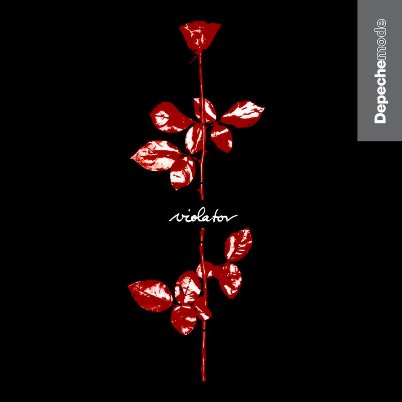 There have been a lot of books about DEPECHE MODE, why did you choose to do one on ‘Violator’?
There have been a lot of books about DEPECHE MODE, why did you choose to do one on ‘Violator’?
The primary reason is that most of the DEPECHE MODE biographies that have been published up to now have been on their history as a whole. What I wanted to do was focus on a particular era… and I say era rather than an album. The period around ‘Violator’ which is 1989-90 is arguably the most important in their career.
The book doesn’t have contributions from the band members, so how did you think out of the box to tell the ‘Violator’ story?
I have been told that DEPECHE MODE do not interviews for biographies, so I needed to talk to people on the periphery of that era, like producers, engineers and tour personnel. So you get everything, BUT from the horse’s mouth. If I didn’t get those people who were intrinsically involved to talk to me, then it would have been just me analysing and reviewing ‘Violator’. There have been many examples of this and I wouldn’t have been able to add anything to the narrative on the album.
Some of the people I spoke to were François Kervorkian who mixed the album, Andy Franks who was involved in the tour, Neil Ferris who was the chief plugger and engineers from every studio they worked in during that period, including two from the Milan sessions; the latter were very funny and informative on some of the things that went on. There were quite a few people who wanted to talk, but not on record, out of loyalty to the band.
‘Personal Jesus’ at the time was quite a startling calling card, from the phoneline ad to the bluesier sound which had started with ‘Pleasure Little Treasure’?
Well you look at that, a lot of people say it’s an obvious track to release. But if you look at what they had done up to that point and since then, they always tried to come out with a record that challenges the pre-conceived ideas of they are. So subsequent to that, you’ve got ‘I Feel You’, prior to that you’ve got records like ‘Stripped’, ‘Blasphemous Rumours’, ‘Master & Servant’…these were tracks that made people go “OH! THIS ISN’T THE DEPECHE I KNEW!”
From a timeline perspective, it was one of the first songs they recorded in Milan. It was certainly the first track François Kervorkian remixed and he did that in Milan, whereas everything else he did for ‘Violator’ happened back in London or New York six months later. They knew that when ‘Personal Jesus’ was recorded and given to François, they knew it was going to be the single because it was so fundamentally different to anything else they’d ever done. It had that rocky influence but also the electronic sensibility that François added to it.
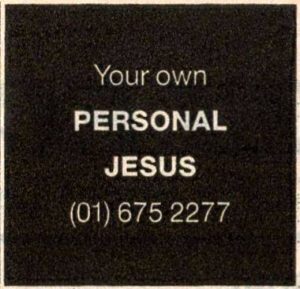 At the end of the day, it’s a good pop song… yes, there are probably songs like ‘Enjoy The Silence’ that were bigger hits, but for a song that was done and dusted very early on in that process, it made perfect sense to release that first.
At the end of the day, it’s a good pop song… yes, there are probably songs like ‘Enjoy The Silence’ that were bigger hits, but for a song that was done and dusted very early on in that process, it made perfect sense to release that first.
There’s a lot of discussion about why ‘Personal Jesus’ was controversial, but they realised they had on their hands, a song that was not only really good, but it was going to cause a certain degree of controversy, not least in the US where all of a sudden, they’d been blown into the mainstream. From what I know, they knew they were playing with fire, so they played with it.
They were on the brink of making something beyond their wildest dreams, so why not capitalise on it? At that point, they were a commercial band and ‘Personal Jesus’ was a very commercial song. The idea to do the “pick up the receiver and I’ll make you a believer” phoneline while you dial this number and it plays the song… in another world, it’s just marketing.
The music press at the time, particularly Q Magazine, seemed to focus a bit too much on the guitar elements of ‘Violator’ when as Alan Wilder quite rightly states, it is still a very electronic album; it was like the press were legitimising DEPECHE MODE because they now used more prominent guitar…
There are several points here; it was a crossroads in popular music then. They had created their own sound as a European electronic band with British sensibilities, and the up until that point, their music had been very electronic… yes there had been guitars before, but they were at a point where they were influenced by electronic dance music like house and techno so they were conscious of that. But equally, they wanted to challenge the idea of what an electronic band should be.
Should an electronic band just be three geezers stood behind keyboards with an incredibly charismatic front man doing their thing? Or should they be band that challenges that idea of what music should be. And I think Flood and Alan Wilder in particular wanted to push that idea forward, so they introduced real instruments. There was sampled guitar before but not until that point, had they made the guitar the lead riff or melody. So that was them putting a stake in the crowd and having the confidence to do it.
The production moved away from drum machines to sampled drum loops like on ‘Halo’ but synthwise, to older contraptions like the Roland System 700?
By that point, the technology and the process had become very much secondary to what they were trying to do. Yes, they were an electronic band; yes, they decided to introduce some guitars; and yes, Flood was pushing them in certain ways. But they just wanted to create music that they thought sounded good and would resonate with their own fans.
They had gone beyond agonising over the technology they were using to make the final outcome. They had a songwriter who could play a guitar lick, so why not use him and produce something that sounds good?
The way ‘Enjoy The Silence’ developed from a sparse ballad into a disco number is well documented, but François Kervorkian’s mix was rejected by Daniel Miller. Have you had a chance to hear it and informatively assess why?
From François’ point of view, he spent a lot of time mixing ‘Personal Jesus’ including the remixes and doing the album, there was his own dissatisfaction with how ‘Enjoy The Silence’ was turning out. It’s worth saying that at that point, it already was a disco track; it was the final mix that there was a disagreement.
It was deemed that François didn’t have enough time to work his magic on it, so it was given back to Daniel to do his thing with his own team of engineers like Phil Legg, resulting in the version we now all know.
The trick to any new book or review about an acclaimed body of work from the past is to uncover previously untold stories. What were the biggest revelations for you?
I don’t think there’s a huge revelation in the book. I think what I found most interesting from collecting all the stories was that the band didn’t really quite understand what was about to hit them. So their behaviour was exactly the same as it had been in the previous 8-9 years. But on the other hand, there were a lot of things in place within the machine to capitalise on it. Some elements of this machine realised this was going to fly!
A lot of people say to me that the ‘Violator’ period was a time when the band were having fun. Martin Gore has said in more recent interviews that ‘Violator’ was the last time they had fun making an album. I think that’s really reflected in the output by the vibe among the members at the time.
There was a lot of experimentation, ‘Violator’ was part of an evolution; dance music was starting to happen with the rave scene; rock, grunge and indie guitar was taking a new step forward. DEPECHE MODE were right at the centre of it, not steering it, but they were a band that wanted to try and embrace as many things as they could. And they were all still young guys!
They were enjoying themselves. Of course, it didn’t continue like that after ‘Violator’.
What was the most difficult part of the book to write?
It was difficult having the patience to accept the music industry operates at much slower level than other industries I’m used to writing about!
People have very sketchy memories and that is not because they are being loyal or they’re nervous about revealing something, it’s because at the end of that day, it is something that happened 25 years ago… a quarter of a century! So when you’re asking people to recollect something that happened in a studio in Milan in 1989, you shouldn’t be surprised when they don’t remember! *laughs*
Yes, I have some wonderful soundbites from the guys in Milan about how they would all jump into a car at the end of sessions and go off to a club in the city to give the DJ a copy of the work to test out. But with something specific like how the footsteps on ‘Personal Jesus’ were recorded, if I asked what kind of flight cases they used, they’re not going to remember!
Those were great footsteps by Fletch though!
It wasn’t just Fletch, it was all of them! *laughs*
Why do you think ‘Violator’ still holds a special resonance? How does it stand up against other electronic or even rock albums?
This is the crux of the book; it’s important that it’s about the recorded output, but of equal importance is the marketing, the visuals, the videos and the way the tour was produced. When you put all that together in an era, that’s when it becomes important.
It’s as important as ‘Black Celebration’, but it’s not on the same scale… and I say that because ‘Black Celebration’ was the first album which they really experimented and found their depth, which arguably Alan Wilder had found his feet in what he was able to do musically. It was also the point when they also realised how popular they were as a live act in the US.
But once they got to ‘Violator’, they were able to amplify that to the power of 10! So it’s a combination of the songs, the production, what they did on tour, the way it was packaged, the videos and the impact of the crossover songs like ‘Enjoy The Silence’.
‘Enjoy The Silence’ won ‘Best British Single’ in the 1991 Brit Awards, although by slightly manipulative phone poll means… but the point is, ‘Violator’ was their crossover album. And if crossovers are important, which arguably they are, it exposed DEPECHE MODE to a whole new audience. Everything changed for them after this album.
So, the way that the current incarnation of DEPECHE MODE play tracks from ‘Violator’ live with The Drumhead and The Noodler… discuss!
The ‘World Violation’ tour was the last time they performed as a synth band, I don’t hold up that tour in the annals of history as maybe other Devotees do. I think the ‘World Violation’ has gained its legendary status simply because people don’t have a decent visual recording of it. I think it was a terrific tour, it was the first time I ever saw them and I was blown away. But I don’t think anything will beat the ‘Devotional’ tour.
The ‘World Violation’ tour was DEPECHE MODE knowing and having the confidence to produce a record in a live setting. The ‘Devotional’ tour was them taking that confidence, with whatever means and substances they were using at the time, to the Nth degree. They realised how far they could go and I think it worked.
The interesting thing about ‘Violator’ is that as Alan has said many times before, it is still incredibly programmed. On the one hand, it’s what makes the album so good, not least because François Kervorkian made it the very precise album that it was.
Now, when you take that precision out of some of the ‘Violator’ songs, as we have later seen with the live performances of ‘World In My Eyes’ and ‘Policy Of Truth’… they were really precise and what made them brilliant songs in the first place.
‘Personal Jesus’ is like the elephant in the room, as it’s basically a rock song.
So those ‘Violator’ songs were all about the precision and to suddenly change those to be live drum songs, it’s maybe going against the strengths of ‘Violator’… songs that were created electronically should perhaps be performed electronically, because that is how the fondness for these songs was obtained.
ELECTRICITYCLUB.CO.UK gives its warmest thanks to Kevin May
Special thanks to Michael Rose for the ‘Personal Jesus’ advert and ‘World Violation’ live photo
‘Halo: The Story Behind DEPECHE MODE’s Classic Album Violator’ is published on 29th September 2022 by Grosvenor House Publishing Limited
http://halotheviolatorbook.com/
https://www.facebook.com/halotheviolatorbook
Text and Interview by Chi Ming Lai
19th March 2019, updated 9th September 2022

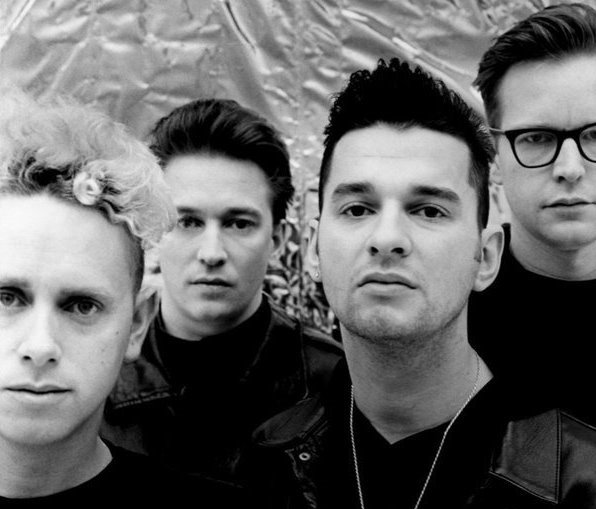
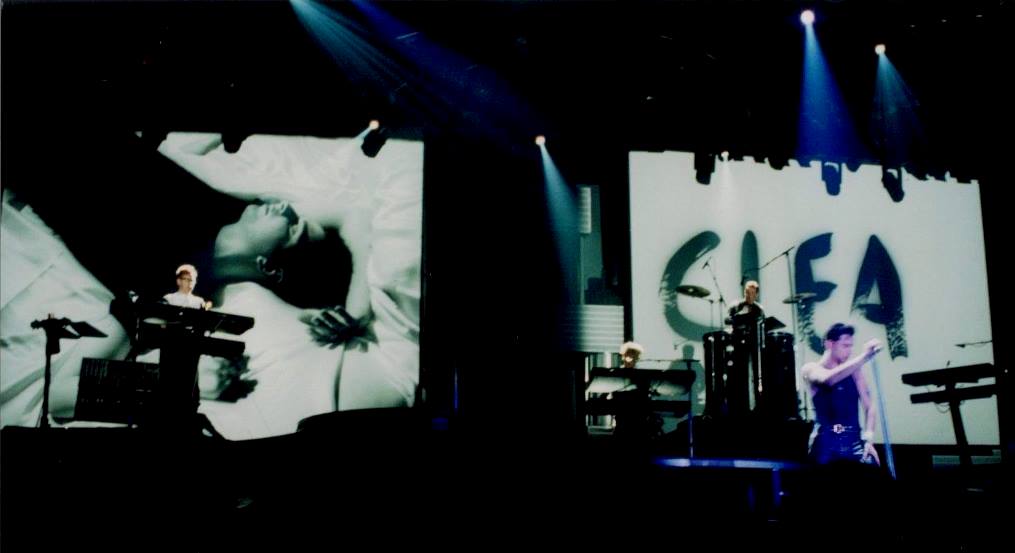
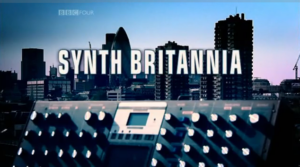
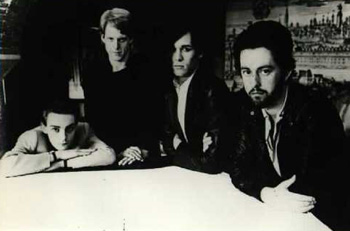
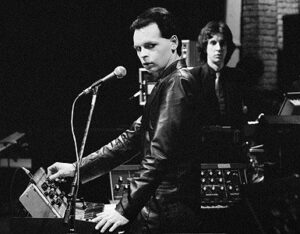
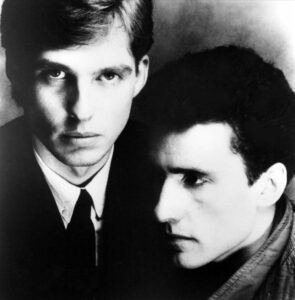

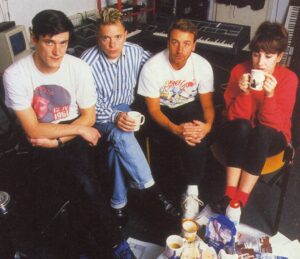
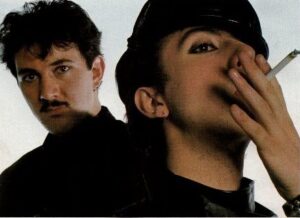
Follow Us!